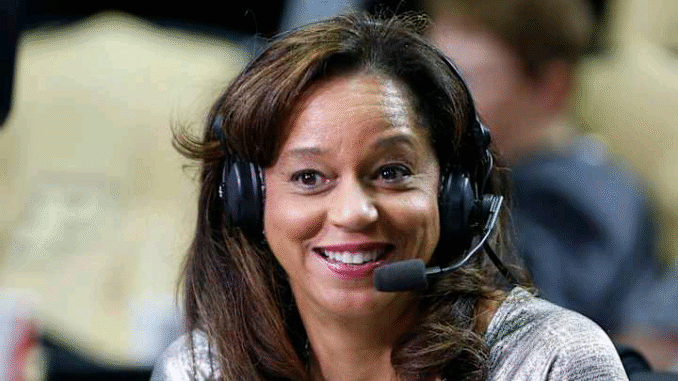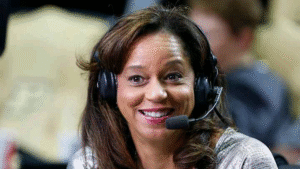
ESPN Analyst Carolyn Peck Revisits Comments on Indiana Fever Without Caitlin Clark
On July 3, during an episode of SportsCenter, former WNBA coach and current ESPN analyst Carolyn Peck made a striking statement about the Indiana Fever that sparked significant discussion in the women’s basketball world. In light of star rookie Caitlin Clark’s continued absence due to a groin injury, Peck argued that the Fever might actually pose a greater threat without Clark on the court.

Peck elaborated on her viewpoint: “I think that Indiana is even more dangerous when Caitlin Clark doesn’t play, because she’s a ball‑dominant guard. The ball is in her hands a lot, so you know what you need to try to take away. But when you look at Indiana now, they’ve got so many weapons.” Her argument was that with Clark sidelined, the Fever became less one‑dimensional—Clark’s high usage can make teams game‑plan solely to neutralize her, whereas without her, Indiana’s other players can freely exploit weaknesses and contribute more dynamically .
The backdrop for Peck’s remarks was a pair of strong performances by the Fever while Clark was out. On July 1, they defeated the Minnesota Lynx 74–59 to clinch the Commissioner’s Cup, followed by an 81–54 blowout over the perennial powerhouse Las Vegas Aces on July 3 . Peck didn’t hesitate to single out key contributors in Clark’s absence:
Kelsey Mitchell dropped 25 points against Las Vegas (9-of-18 shooting, including 4-of-6 from deep).
Aari McDonald stepped in as a perimeter playmaker.
Aliyah Boston anchored the interior with strong defensive efforts .
Peck connected their standout performances to improved on‑ball defense and deeper rotational flexibility—traits that emerged after Clark’s absence freed up touches to other scorers and made Indiana less predictable . She also emphasized that the Fever’s defensive presence intensified when Clark wasn’t the focal point .
Examining the Numbers: Dangerous Without Clark?
Supporters of Peck’s argument cite the Fever’s record this season: 5–4 with Clark in the lineup, and 5–4 without her . Additionally, offensive efficiency dipped slightly without Clark—from around 85.0 with her to 80.2 without—but the defense improved, allowing roughly five fewer points per 100 possessions .
Peck sees this as evidence of a more balanced team when Clark is sidelined. With Clark dominating possessions, opponents can strategize around her. Without that singular focus, the Fever scatter threats from more players, making scouting tougher .
Criticism & Social Media Backlash
Peck’s assertion triggered strong backlash, particularly among Clark’s substantial fanbase. Many saw her comments not as analytical but dismissive—or worse, as criticism from someone who “hates” Clark . On X (formerly Twitter), one user claimed:
> “Crazy levels of hate for the person who brought WNBA to relevancy.”
Another pointed out the double standard:
> “Lol. Like saying Warriors are more dangerous without Steph Curry if they win a few games without him.”
Others demanded journalistic objectivity, asking why an ESPN analyst would promote such a divisive narrative .
Compounding the issue, Peck had championed Angel Reese for Rookie of the Year the prior season—an argument perceived by many as undermining Clark. Critics framed Peck’s remarks as continuation of that perspective .
A Brief Dip in Performance Without Clark
A few weeks earlier, in mid-June, the Fever had a lukewarm stretch without Clark. They fell 77–58 to the Atlanta Dream in the Commissioner’s Cup semifinals, their lowest offensive output since 2017 . During that five-game stretch without Clark:
Their scoring average plummeted from 88.0 with her to just 76.4 without—moving from 2nd in the league to 2nd-worst .
Fast‑break points shrank dramatically—from 12.3 per game to a league-worst 3.8 .
Their pace (PACE/40) dropped from ~84.12 (second‑highest) to ~76.90 (dead last) .
So, while recent wins were impressive, the overall data still shows offensive stagnation without Clark. While defense may have improved, scoring took a serious hit .
Peck’s Response on Social Media
Following a 65–72 loss to the Los Angeles Sparks on July 5 (still without Clark), scrutiny intensified—and so did Peck’s response. On July 6, she took to X (Twitter) to clarify:
> “I did not say Caitlin Clark is not valuable. She’s a great player. For those who only see Caitlin, I was complimenting the rest of the team. The Fever have several weapons. Yes, they lost last night. They have lost games w/ her. RESPECT to the WHOLE @IndianaFever team.”
In a follow-up post, continuing her coach’s perspective:
> “As a coach, if you have ever prepared a scouting report? Scout the Fever w & w/out Caitlin. What do you have to take away in both scenarios? They are different. One is not easier than the other, just different. There is a lot of talent on that team.”
This reframing softened the initial, more provocative claim. Peck emphasized that she wasn’t saying the team was better without Clark—just that evaluating them without her presented distinct challenges .
Did Peck Contradict Herself?
On the surface, Peck’s clarification that neither lineup scenario is inherently “easier” seems to clash with her earlier remarks that Indiana is “more dangerous” without Clark. Critics interpreted the backtracking as contradictory—especially since “more dangerous” carries implications of greater threat and potential success compared to the alternative.
Defenders argue that “dangerous” can simply mean they’ll be tougher to defend, not necessarily more likely to win. Yet, the shift from a bold claim to a measured explanation invited skepticism—and the suggestion that Peck might have refined her stance under public pressure.
Overall Context: Clark’s Broad Impact
Caitlin Clark was not only shaping the Fever on court; she’d also become a catalyst for commercial and media growth. Her rookie season elevated attendance, boosted TV ratings by about 300%, generated massive merchandise sales, and even drew analysts to the narrative of “Clark‑onomics” . This fame also fueled the intense response to any critique—fans see attacking Clark as attacking the league’s momentum.
So, What Should We Make of All This?
1. Peck’s Core Insight: Without Clark, Indiana becomes harder to scout—they distribute the ball more widely, use defensive length better, and avoid predictable offensive sets.
2. Offensive Tradeoff: Without Clark’s volume scoring, the Fever’s offense shows signs of stalling—faster pace and fast-break opportunities diminish.
3. Contextual Performance: Recent wins without Clark have been strong, but the broader data suggests offensive and tempo drops.
4. Fan Sensitivity: Given Clark’s profile, any comment that seems to elevate a team without her draws backlash—especially amid ongoing rookie debates and media narratives.
5. Clarification vs. Reversal: Peck’s follow-ups suggest nuance—she does not claim the Fever are better without Clark, but rather “different” and still dangerous.
Bottom Line
The initial claim—that Indiana is “more dangerous” without Clark—was attention-grabbing and partially backed by recent performances and defensive gains.
Yet, data on offense and pace indicates the team does sacrifice scoring potency without Clark.
Peck’s clarifying remarks softened her stance, but invite scrutiny—was this a coach’s tactful adjustment or mere backpedaling?
Fan reaction underscores just how potent a lightning rod Clark has become. Soon after her name pops up, emotions follow.
At its core, Peck’s point wasn’t to diminish Clark’s value—she remains a cornerstone for the Fever’s future success. But from a strategic, coaching standpoint, Indiana without Clark presents a different kind of challenge—and maybe that variety is precisely what makes them “dangerous” in an X-factor way.
Leave a Reply